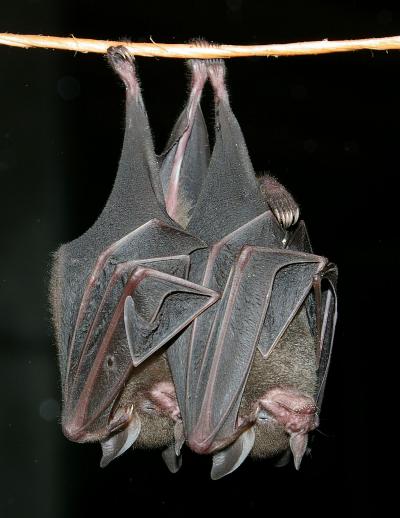Increasing light pollution in tropical habitats could be hampering regeneration of rainforests because of its impact on nocturnal seed-dispersers.These new findings were reported by scientists from the German Leibniz Institute for Zoo and Wildlife Research Berlin (IZW). The study – published in the British Ecological Society’s Journal of Applied Ecology – is the first to show that seed-dispersing bats avoid feeding in light-polluted areas.
Working in Costa Rica with Sowell’s short-tailed bats (Carollia sowelli), Daniel Lewanzik from the IZW gave the bats a simple choice. He divided a flight cage into two compartments. One was naturally dark and the other was illuminated by a sodium street lamp, the most common form of street lighting in the world. Inside both parts of the cage the bats were offered their favourite fruits to harvest: pepper plants, nightshade and figs.
The results revealed that bats flew into the dark compartment twice as often as the compartment lit by a street lamp. The bats also harvested fruits almost twice as often in the dark compartment.
In a second experiment Lewanzik illuminated pepper plants growing in the wild with a street light and measured the percentage of ripe fruit which bats harvested from plants in a dark location and from lit plants. While bats harvested 100 per cent of the marked, ripe fruit from the plants in the dark, only 78 per cent were taken from the lit plants.
Although insect-eating bats have been shown to avoid foraging in light-polluted areas, this is the first study to show that fruit-eating bats also avoid lit areas.
This has important implications for forest regeneration in the tropics. Bats play a key role in pollinating plants and spreading their seeds, especially the seeds of species that are first to recolonise cleared land. “In tropical habitats bat-mediated seed dispersal is necessary for the rapid succession of deforested land because few other animals than bats disperse seeds into open habitats,” says Daniel Lewanzik, a PhD student at the IZW and first author of the study.
Under naturally dark conditions, bats produce a copious ‘seed rain’ when defecating seeds while flying. By reducing foraging of fruit-eating bats in lit areas, light pollution is likely to reduce seed rain.
In many tropical countries, light pollution is increasing rapidly as economies and human populations grow. Natural succession of forests could therefore suffer as tropical habitats become increasingly illuminated. “The impact of light pollution could be reduced by changes in lighting design and by setting up dark refuges connected by dark corridors for light-sensitive species like bats,” Lewanzik says.
Publication:
Lewanzik D, Voigt CC (2014): Artificial light puts ecosystem services of frugivorous bats at risk. Journal of Applied Ecology. DOI: 10.1111/1365-2664.12206.



This study allows one to understand how important darkness can be. It shows how the effect of light pollution on bats has many implications for the environment. In forested areas, genetic diversity of the plant life may be affected as pollination becomes less efficient. The ever increasing areas of land which have undergone logging and deforestation may experience reduced chances of recovery. This impacts climate change as forests play an important role as carbon sinks.
Another aspect to consider is the implications for the agricultural industry. As light pollution increases, crops such as bananas, cocoa and agave ( the plant used to produce tequila), which rely on pollination by bats will experience decreased yields. Families which rely on these crops could potentially lose their livelihoods.
It is amazing to consider how bats, alone, are able to play an extremely significant role in maintaining an ecosystem and how one factor such as light pollution has the potential to cause disatorous effects within that ecosystem. I think the world needs to consider the effects that light pollution is having on the environment and take steps to reduce this pollution. By reducing our need for lighting at night we will also reduce the amount of electrical energy we use and this in itself has many positive implications.